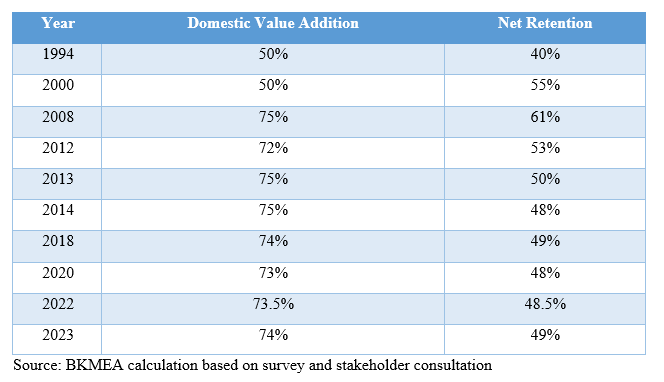Bangladesh Knitwear Sector contribution to the Socio-economic dynamics in the country

Bangladesh's knitwear sector's export increased from US$12,049.81 million in FY 13-14 to US$25,738.20 million in FY 22-23. When it comes to export growth, the sector has experienced, on an average, a growth rate of 10.23% during these 10 fiscal years. This growth trajectory can be attributed to the sector’s resilient and sustained export performance amidst the adverse global financial situations. The knitwear sector has been the lifeline of Bangladesh’s economy for the past two and a half decades. The sector is now the largest exporter earning sector in the country.
Macroeconomic contribution: In FY 2022–23, the knitwear sector's share in the country’s Gross domestic product (GDP) was 5.67%, while simultaneously,the sector's share of the national exports was 46.34 %. The sector also facilitates other sectors of the country, such as banking, insurance, and logistics, known as the forward linkage sector.
Employment generation, Women empowerment
Since it’s starting of operation in the late 70s, the knitwear sector has played a substantial role in generating employment opportunities and fostering women's empowerment in Bangladesh. As of FY-2022-23, the sector was responsible for creating 1.9 million direct jobs with an additional 0.5 million indirect jobs. It has also created formal employment opportunities for the poor, uneducated, and unskilled people. Notably, in the sector, women make up a substantial portion of the workforce, making about 65% of the total workforce; most of them come from the disadvantaged and improvised section of society.
Poverty Reduction: The knitwear industry has helped millions of people lifted out of poverty. The sector’s contribution to reduce national poverty was 9.10% in the FY 2022-23.
Development of Backward Linkage sector: Bangladesh's knitwear sector has led to the development of a strong backward linkage sector. The backward linkage considers as one of the core strengths of the knitwear sector. As, in most cases, the knitwear production process starts from cotton to yarn to finish products, and this has been possible due to the support from backward linkage industry. And thus, the sector has been able to sustain its global competitive advantage. Thus Bangladesh knitwear sector contributes significantly to the domestic value addition of, on an average, 75%.
Domestic Value Addition and Net Retention from Knitwear industry

Development of Shipping and Logistics Industry
The knitwear sector has led to the growth of the shipping industry in Bangladesh through establishing the container yards, expanding the port facilities to handle large container trains, and improving cargo handling and storage facilities. In FY 2022-23, the knitwear sector contributed to US$ 155 million in the shipping and logistics industry. Knitwear entrepreneurs also rely heavily on Clearing and forwarding Agents for customs clearance of raw materials and finished products.
Development of Banking and Insurance Sector
Bangladesh's knitwear sector has made a significant contribution to boosting the country’s banking and insurance sectors. In FY 2022-23, the banking sector earned about 286 billion BDT from knitwear sector businesses through interest, charges, and L/C fees. It is stunning to note that more than one-tenth of commercial banks' assets are tied to the RMG and textile sectors.
Core Strength of the Knitwear Industry

• Strong backward linkages that support the sector to add on an average 70 % value addition.;
• A large number of unskilled labor forces who are easily adaptable and trainable to new technology and best practices;
• A positive mindset of knitwear entrepreneurs towards embracing best practices and any emerging technology developed for the global Textile and Apparel industry;
• The government of Bangladesh’s strong, resolute and supportive stance towards bolstering the Apparel industry;
• Duty- free and quota- free access to the markets of several developed and developing countries, including the EU, Canada, Japan, South Korea, Australia, Chili, China, India, etc.;
• Bangladesh is a member of the Multilateral Investment Guarantee Agency (MIGA) under which protection and safety measures are available;
• Child- labor -free, Socially and environmentally compliant factories;
• Environmentally compliant ISO, BSCIS, WRAP, OKETEX, etc. certified factories;
• High -quality diversified knitwear products with comparatively cheap prices.



BKMEA ® is a registered Trademark of BKMEA Copyright © 2024 bkmea.com.